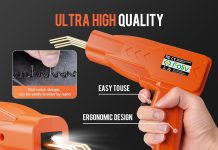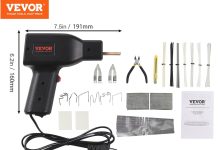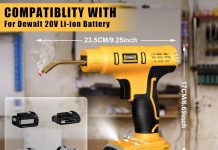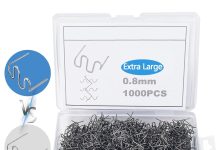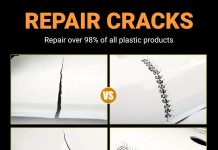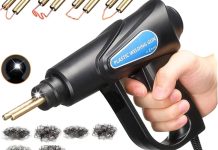Flux-cored arc welding is a versatile and efficient method specifically designed for heavy plate welding. With its unique combination of benefits, this welding technique has gained popularity across various industries. In this article, we will explore the advantages of using flux-cored arc welding for heavy plate welding and how it can enhance productivity, quality, and cost-effectiveness in your welding operations. Whether you are a professional welder or someone interested in the field, read on to discover the practical advantages that make flux-cored arc welding a valuable tool for heavy plate welding.
Review contents
Increased Efficiency
Flux-cored arc welding (FCAW) offers several advantages that enhance efficiency in the welding process. One of the key benefits is the increased deposition rates that FCAW provides. The flux in the welding wire creates a shielding gas, which improves the efficiency of the arc and consequently increases the speed at which deposition occurs. This means that more weld metal is deposited in a shorter amount of time, allowing for quicker completion of welding tasks.
Another factor that contributes to the increased efficiency of FCAW is the elimination of the need for pre-cleaning. Unlike other welding processes, FCAW allows for welding to take place without the necessity of removing contaminants and impurities from the base metal beforehand. This saves a significant amount of time and effort, as the welding process can begin immediately without the requirement of extensive surface preparation.
Furthermore, FCAW enables higher travel speeds compared to other welding methods. The combination of the flux and the constant wire feed results in a stable arc and a more controlled heat input. This allows the welder to move at a faster pace while maintaining the required quality of the weld. The ability to weld at higher travel speeds translates to increased productivity and efficiency, especially when working on projects with tight deadlines.
Increased Penetration
When it comes to heavy plate welding, achieving deep weld penetration is essential to ensure the structural integrity and strength of the joints. FCAW offers superior penetration capabilities compared to other welding processes. The flux in the welding wire generates a slag that shields the weld pool, facilitating deeper penetration into the base metal.
The ability to achieve deep weld penetration also allows for welding thicker plates. With FCAW, welds on thicker materials can be made more efficiently, as the process allows for higher deposition rates and faster travel speeds. This eliminates the need for multiple passes and reduces the welding time required for thicker plate joints.
Another advantage provided by FCAW is the reduced chances of incomplete fusion. Incomplete fusion occurs when the weld does not fully penetrate or fuse with the base metal, resulting in weak and unreliable joints. The high heat input and improved penetration capabilities of FCAW minimize the likelihood of incomplete fusion, ensuring that the welds are sound and structurally sound.
Versatility
The versatility of FCAW is a significant advantage, making it suitable for various positions and applications in heavy plate welding. It can be used in flat, horizontal, vertical, and overhead positions, allowing welders to work in any orientation required by the project. This versatility enhances the flexibility of FCAW and makes it adaptable to different welding scenarios and environments.
Additionally, FCAW is compatible with a wide range of base metals, including carbon steel, stainless steel, and low-alloy steel. This compatibility makes FCAW a versatile choice for welding various types of heavy plates. Whether working with shipbuilding, construction, or structural fabrication, FCAW offers the versatility needed to tackle different applications and projects efficiently.
Less Distortion
One of the challenges faced in heavy plate welding is distortion, which refers to the deformation of the base metal caused by the heat input during the welding process. FCAW helps to address this issue by providing lower heat input compared to other welding methods. The controlled heat input reduces the overall thermal stress on the base metal, resulting in decreased distortion and warping.
Another factor contributing to the reduced distortion with FCAW is the minimized need for post-welding processes. Unlike other welding methods that may require extensive grinding and machining to correct distortions, FCAW produces welds with lower levels of residual stress. This minimizes the need for additional post-welding processes, saving time and resources.
By reducing distortion and minimizing post-welding processes, FCAW ensures that heavy plate weldments maintain their structural integrity and dimensional accuracy, leading to more precise and reliable end products.
Increased Operator Comfort
FCAW prioritizes the comfort and safety of welders by minimizing factors that can negatively impact their working environment. One significant advantage of FCAW is the reduced smoke and fume production. The flux used in FCAW generates a shielding gas that helps to control the emission of smoke and fumes. This creates a healthier and cleaner working environment, reducing the potential inhalation of harmful substances for the welder and their colleagues.
Improved visibility during welding is another advantage that contributes to operator comfort. FCAW produces less spatter compared to other welding processes, which can obstruct the welding area and reduce visibility. The reduced spatter allows for better visibility of the weld pool and the base metal, making it easier to maintain control and produce high-quality welds.
Additionally, FCAW offers easier handling of equipment for operators. The process typically uses a wire feeder and a welding gun, making it less physically demanding compared to manual welding techniques. This reduces the strain on the welder and improves overall comfort during prolonged welding sessions.
Cost-effectiveness
In heavy plate welding, cost-effectiveness is a crucial factor to consider. FCAW offers several advantages that contribute to its cost-effectiveness compared to other welding methods. One of the key cost-saving factors is the use of less expensive consumables. FCAW utilizes self-shielded or gas-shielded wires, which tend to be more affordable than some other types of welding consumables.
Another cost-saving aspect of FCAW is the reduced need for skilled labor. With FCAW, the process is relatively straightforward and can be easily learned and performed by welders with less experience. This eliminates the need for highly skilled welders and allows for more efficient utilization of the available workforce, resulting in cost savings for companies.
Furthermore, FCAW requires minimal post-welding cleaning compared to other processes. The slag produced during FCAW acts as a protective layer and reduces spatter and splatter. This minimizes the need for extensive cleaning, such as grinding or chipping, after completing the welds. The reduced post-welding cleaning requirements save time and resources, contributing to the overall cost-effectiveness of FCAW.
Increased Productivity
When it comes to heavy plate welding, productivity is of utmost importance. FCAW offers advantages that significantly enhance the welding process’s productivity, allowing for faster completion of projects. One of these advantages is the faster welding process enabled by FCAW. The high deposition rates, coupled with the ability to weld at higher travel speeds, result in more efficient welds and shorter welding times.
Additionally, FCAW reduces downtime for electrode change. Unlike some other welding techniques that require frequent electrode change, FCAW utilizes continuous wire feed, eliminating the need for frequent interruptions to replace electrodes. This saves time and increases productivity, especially in large-scale welding projects where minimal downtime is crucial.
Moreover, the ability to weld in all positions is a noteworthy advantage of FCAW that enhances productivity. FCAW allows for welding in flat, horizontal, vertical, and overhead positions, providing flexibility and adaptability to different welding scenarios and project requirements. Welding in all positions eliminates the need for additional setup or repositioning, improving overall productivity.
Improved Weld Quality
Heavy plate welding requires strong, reliable, and visually appealing welds. FCAW offers advantages that contribute to improved weld quality, ensuring that the welds meet the required standards and specifications. One of the key qualities enhanced by FCAW is higher tensile strength. The improved penetration and fusion achieved with FCAW result in welds with superior tensile strength, enhancing the durability and load-bearing capacity of the joints.
Moreover, FCAW provides better impact properties compared to other welding processes. The controlled heat input and the improved fusion achieved by FCAW contribute to welds that exhibit excellent resistance to cracking or fracturing under impact loadings. This is particularly important in heavy plate welding, where the welds may be subjected to substantial loads and stresses.
Furthermore, FCAW produces weld bead appearances that are visually appealing. The smooth and consistent weld bead appearance achieved with FCAW enhances aesthetics and provides a more professional finish to the welded joints. This is particularly advantageous in applications where the appearance of the weld is significant, such as architectural structures or visible components.
Ease of Use
FCAW offers advantages that make it easy to set up, operate, and learn, even for novice welders. The process’s simplicity is evident in the simplified setup and operation, requiring minimal adjustments compared to other welding methods. FCAW typically involves a wire feeder and a welding gun, making the equipment setup straightforward and reducing the time spent on preparation.
Additionally, FCAW requires less operator training compared to some other welding techniques. The process’s straightforward nature and reduced complexity make it easier for welders to learn and execute, even without extensive prior experience. This reduces the learning curve, allowing for faster adoption and implementation of FCAW in welding operations.
Moreover, FCAW offers a lower risk of weld defects compared to other methods. The flux used in FCAW generates a slag that acts as a protective layer, reducing the likelihood of weld defects such as lack of fusion or excessive spatter. This provides added assurance for operators, increasing their confidence in the process and reducing the risk of rework or weld repairs.
Environmentally Friendly
In today’s world, sustainability and environmental considerations are gaining increasing importance. FCAW offers advantages that align with these principles, making it an environmentally friendly choice for heavy plate welding. One significant advantage is the reduced emissions compared to other welding processes. FCAW generates less smoke and fumes, minimizing the release of harmful substances into the atmosphere. This contributes to a cleaner and healthier working environment for the welders and reduces the impact on the surrounding ecosystem.
Furthermore, FCAW results in lower energy consumption compared to some other welding techniques. The improved efficiency of the deposition process and the reduced need for post-welding cleaning contribute to energy savings. This not only reduces operating costs but also aligns with sustainability goals by conserving energy resources and reducing the carbon footprint associated with welding operations.
In conclusion, flux-cored arc welding (FCAW) offers numerous advantages for heavy plate welding. The increased efficiency provided by higher deposition rates, no need for pre-cleaning, and higher travel speeds optimize productivity and allow for quicker completion of welding tasks. FCAW’s capabilities enable deeper weld penetration, the ability to weld thicker plates, and reduced chances of incomplete fusion, ensuring reliable and robust weld joints. The versatility of FCAW makes it suitable for various positions and applications, while its ability to minimize distortion and post-welding processes enhances efficiency and saves time. FCAW prioritizes operator comfort by reducing smoke and fume production, improving visibility, and facilitating easier handling of equipment. The cost-effectiveness of FCAW is evident in the use of less expensive consumables, reduced need for skilled labor, and minimal post-welding cleaning required. Finally, FCAW’s advantages in terms of increased productivity, improved weld quality, ease of use, and environmental friendliness further solidify its position as an excellent choice for heavy plate welding.

